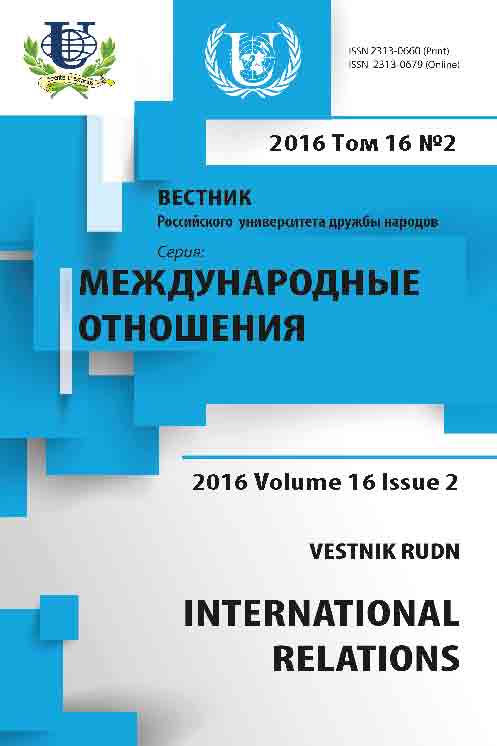Soft power as a means of fighting international terrorism: a case study of Nigeria’s “Boko Haram”
- Authors: Bakare I.A.1
-
Affiliations:
- Peoples’ Friendship University of Russia
- Issue: Vol 16, No 2 (2016): Africa in International Relations
- Pages: 285-295
- Section: ARTICLES
- URL: https://journals.rudn.ru/international-relations/article/view/14277
- ID: 14277
Cite item
Full Text
Abstract
The recent rise in global terrorism is alarming, but it also reaffirms the failure of our purely hard military approach to counter the phenomenon. This paper analyzes soft power as a means to combating terrorism, with the role of education, religion and international cooperation. The case of Boko Haram, the militant Islamist group operating in Northern Nigeria, is analyzed. This group has been attracting increasing levels of attention. The group is becoming ever more daring and violent. It is unlikely that Boko Haram will be defeated totally through military means. “Soft Power” will play a crucial role in our ability to attract the moderates and deny the extremists new recruits. Islamic education is viewed as a key instrument of these “soft power” counter-terrorism strategy. Islamic education refers to the totality of the upbringing of an individual within the content and context of Islam. The Almajiri system of education in Nigeria is analyzed in the article. Besides education, international cooperation is analyzed with the special focus on Moroccan experience of learning of Sunni Maliki jurisprudence and Achaari theology. The author underlines that many African countries requested Morocco to share its experiences in the education of Imams and signed several cooperation agreements.
Keywords
About the authors
Ilesanmi Abiodun Bakare
Peoples’ Friendship University of Russia
Author for correspondence.
Email: bakareilesanmi@gmail.com
Moscow, Russia
References
- Abdulhadi Alshehri, 2010. Soft Power As An Alternative To Hard Power In Counterterrorism In Saudi Arabia. USAWC Strategy Research Project.
- Adamu A.U., 2010. Islamic Education in African Countries—The Evolution of Non-Formal Al-Muhajirun Education in Northern Nigeria. Islamic Education in African Countries, Istanbul, Republic of Turkey.
- Adebowale O.T., 2015. Youth unemployment and poverty in Nigeria. International Journal of Sociology and Anthropology Research, Vol.1, no.2, pp.23-39.
- Adesoji A., 2010. The Boko Haram Uprising and Islamic Revivalism in Nigeria. Africa Spectrum 45, no. 2, pp. 95-108.
- Ajidagba U.A., 1998. An overview of islamic education system in Nigeria. Journal Of Curriculum And Instruction, Vol. 5, no. 1-2, pp. 87-92
- Akinola Olojo, 2013. Nigeria's Troubled North: Interrogating the Drivers of Public Support for Boko Haram, ICCT Research Paper.
- Alao A., 2010. Islamic Radicalisation and Violence in Nigeria. Available at: http://www.ideaageconsulting.com/support-files/0-irnavin.pdf (date of access: 15.04.2016)
- Cook B.J. Islam - History of Islamic Education, Aims and Objectives of Islamic Education. Available at: http://education.stateuniversity.com/pages/2133/Islam.html#ixzz4D3SRwtdq (date of access: 15.04.2016)
- Cook D. The Rise of Boko Haram in Nigeria. Combating Terrorism Centre. Available at: https://www.ctc.usma.edu//posts/the-rise-of-boko-haram-in-nigeria ( date of access: 10.05.2016)
- Hauschildt T., Malik H., 2014. The fight against Boko Haram: Why hard power alone will not suffice. Human Rights and Conflict Resolution, Iss. 2, no. 3.
- Hoechner H., 2015. Porridge, piety and patience: young qur'anic students' experiences of poverty in Kano, Nigeria. Africa, Vol. 85, Iss.2, pp. 269-288, doi: 10.1017/S0001972015000029. Available at: http://journals.cambridge.org/abstract_S0001972015000029 (date of access: 15.04.2016)
- Freedom C. Onuoha., 2014. Why Do Youth Join Boko Haram? United State Institute of Peace. Special Report 348. Available at: www.usip.org (date of access: 15.04.2016)
- Iro Aghedo, Oarhe Osumah, 2012. The Boko Haram Uprising: How Should Nigeria Respond? Third World Quarterly, Vol. 33, Iss.5, pp. 853-869.
- Kazeem S.A., Balogun K.Y, 2013. Problems Facing Islamic Education: Evidence from Nigeria. Journal of Educational and Social Research, Rome-Italy, MCSER Publishing, Vol. 3, no. 9.
- Kruglova A., 2015. Boko "Halal"? Western education should be used as a weapon against terror. Foreign Affairs & Security.
- Nye Joseph S., 2004. Soft Power: The Means to Success in World Politics. New York: Public Affairs.
- Olugbeko, Smart Odunayo, Asagha, Nkoro E., 2014. Quality Education as a Panacea to Global Security Challenges: A Case Study of Nigeria. International Conference on Arts, Economics and Management (ICAEM'14), Dubai.
- Omoluwa Olusegun, 2014. Functional education: a tool for combating terrorism in Nigeria. International Journal of Technical Research and Applications, Vol. 2, Sp. Iss. 7, pp. 35-39.
- Owolade F., 2014. Boko Haram: How a Militant Islamist Group Emerged in Nigeria. Gatestone Institute. Available at: http://www.gatestoneinstitute.org/4232/boko-haram-nigeria (date of access: 10.05.2015)
- Seul J., 1999. Ours is the Way of God: Religion, Identity, and Intergroup Conflict. Journal of Peace Research, Vol. 36, no. 5, pp. 553-569. http://www.mcser.org/journal/index.php/jesr/article/viewFile/2342/2317 (date of access: 15.04.2016)
- Sergie M.A., Johnson T., 2011. Backgrounder — Boko Haram. Council of Foreign Relations. Available at: http://www.cfr.org/nigeria/boko-haram/p25739 (date of access: 15.04.2016)
- Solomon Effiong Udounwa, 2013. Boko Haram: Developing New Strategies to Combat Terrorism in Nigeria. USAWC Strategy Research Project.
- "START" National Consortium for the Study of Terrorism and Responses to Terrorism. Mass-Fatality, Coordinated Attacks Worldwide, and Terrorism in France. Available at: https://www.start.umd.edu/pubs/START_ParisMassCasualtyCoordinatedAttack_Nov2015.pdf (date of access: 15.04.2016)
- Walker A., 2012. What is Boko Haram? USIP Special Report, Washington: United States Institute of Peace. Available at: http://www.usip.org/files/resources/SR308.pdf. (date of access: 15.04.2016)
Supplementary files










